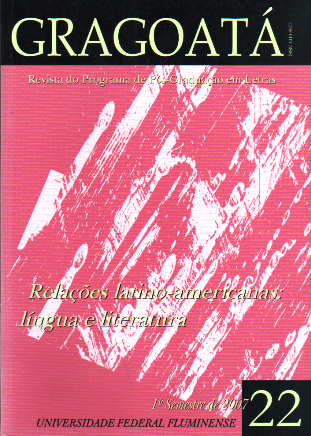“Nós Outros, Neo-Ibéricos”: O Entre-Lugar da identidade nacional no pensamento de Manoel Bomfim
Palavras-chave:
parasitismo, pós-colonial, iden¬tidade, entre-lugar, neo-ibéricoResumo
A obra de Manoel Bomfim (1868-1932) demonstra uma compreensão profunda e bastante avançada para sua época do complexo e ambíguo relacionamento entre os paises ibéricos e, para usar as próprias palavras do pensador sergipano,”nós outros, neo-ibéricos,” terminologia que ele prefere a “latino-americanos.” Bomfim define o singular espaço ocupado pelo Brasil dentro da geografia sócio-politico-cultural lusófona em termos de uma dialética entre uma mentalidade consciente da sua diferença, que poderíamos qualificar como pós-colonial já no século XVII, e o persistente “parasitismo” da herança ibérica, que teria “infectado” nosso corpo político e social, deixando seqüelas das quais ainda não nos conseguimos recuperar. Rejeitando as noções de síntese e harmonia caras ao pensamento oficial e codificadas no século XIX pelos textos de von Martius, Bomfim constrói a identidade brasileira como um “entre-lugar,” configurando-a através de uma espécie de psicomaquia entre de um lado um espírito independente, criativo e contestador, presente desde o inicio da nossa formação, e do outro um corpo (sócio-político) doente, contagiado pelo decadente colonialismo português. Seus escritos prefiguram muitas das idéias que seriam posteriormente desenvolvidas pela nata da intelectualidade brasileira durante a primeira metade do século XX, como Sérgio Buarque de Holanda, Gilberto Freyre e Caio Prado, Jr, entre outros.Downloads
Downloads
Publicado
Edição
Seção
Licença
AUTORIZAÇÃO
Autores que publicam em Gragoatá concordam com os seguintes termos:
Os autores mantêm os direitos e cedem à revista o direito à primeira publicação, simultaneamente submetido a uma licença Creative Commons Atribuição 4.0 Internacional (CC BY 4.0), que permite o compartilhamento por terceiros com a devida menção ao autor e à primeira publicação pela Gragoatá.
Os autores podem entrar em acordos contratuais adicionais e separados para a distribuição não exclusiva da versão publicada da obra (por exemplo, postá-la em um repositório institucional ou publicá-la em um livro), com o reconhecimento de sua publicação inicial na Gragoatá.
A Gragoatá utiliza uma Licença Creative Commons - Atribuição CC BY 4.0 Internacional.











